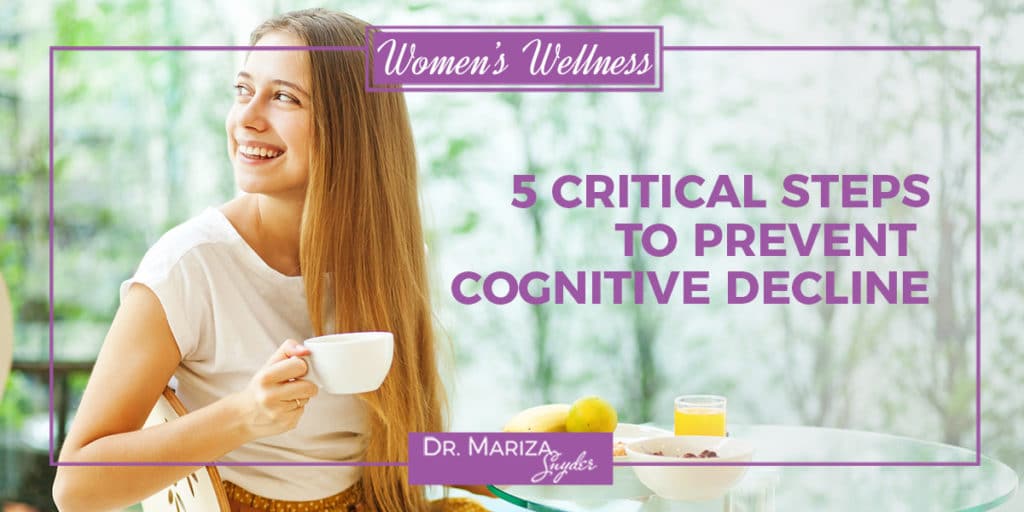
Have you ever set your keys down and a minute later had the entire family tearing the house apart searching for them? Or maybe you’ve been deep in conversation with someone and suddenly completely forgot what you were talking about. You could be experiencing the very beginning stages of cognitive decline.
A survey on the prevalence of subjective cognitive decline (SCD) in the U.S. found that 1 in 9 adults experienced SCD.
And as we get older, things only get worse–unless we get better first!
Meet: Your brain. It’s the master organ of your central nervous system, endocrine system, and the seat of your consciousness.
So if you want to look, feel, and live your best life without so much as a possibility of cognitive decline, now is a better time than ever to start giving your brain WAY more love.
Because even a little more love today can literally add YEARS to your best life.
This is why I strongly urge you to start adopting safe and effective ways to protect your brain health and keep your thinking sharp.
But even if losing your keys or train of thought sounds all too familiar, there’s no cause for alarm.
In just five simple steps, you can make a big difference in your brain health and never have to deal with Alzheimer’s or cognitive decline even at old age.
Tips to Prevent Cognitive Decline and Boost Brain Health
Step 1: Eat Gut and Liver-Loving Anti-Inflammatory Foods
You’ve probably heard (if not by me, by someone else!) that you should immediately reduce your intake of sugar, processed foods, and alcohol. That is and will always be true!
Excess sugar sends your glucose levels through the roof, upsets the balance of the gut lining, and causes inflammation, opening you up to a plethora of health challenges, including diabetes and cognitive decline.
High blood glucose levels may result in brain atrophy (or brain shrinkage), which brings about cognitive difficulties. [3] Moreso, 60% of cognitive decline can be prevented by managing blood sugar alone. That, my friend, is a lot.
Eat lots of non-starchy veggies, fruits, and healthy fats (walnuts, flaxseeds, avocados, salmon, olive oil, olives, ghee).
Looking for some great healthy recipes? Check out part 3 of my Essential Oils Menopause Solution Book.
Step 2: Practice Intermittent Fasting
Tons of research suggest that intermittent fasting slows down aging and also boosts neuroplasticity in the brain.
This improves brain function and boosts its resistance to disease and injury.
So, if you’re looking to ward off neurodegenerative diseases like Alzheimer’s, other forms of dementia, and Parkinson’s, all while improving mood and memory, intermittent fasting is your friend.
Incorporate a 12 to 18-hour intermittent fast overnight to restrict your eating window. I typically go from 14 to 16 hours between 7:00 PM and 11:00 AM the following day.
Fasting helps clear out the junk in our system. So, for example, grab dinner at 6:00 PM, begin your fast, then resume with breakfast at 10:00 AM the following morning.
You may want to ease in with a 12-12 fasting window and gradually build up to a 16-8. Ensure you go at a comfortable pace that works for you and be kind to yourself!
Step 3: Get Enough Quality Sleep
Sleep is crucial to various brain functions, and you may find that you experience brain fog when you don’t get adequate quality sleep.
One study showed that while you sleep, your lymphatic system might clear beta-amyloid, that protein associated with Alzheimer’s, more rapidly than it does while you’re awake.
When you sleep, your brain takes a retreat to prepare itself for a kickass refire.
If you rob it of that sleep, you also rob yourself of optimal brain function.
Continual sleep deprivation may cause you to experience cognitive decline because of its impact on nerve cell communication.
Aim for 7-9 hours of quality sleep every night.
I definitely recommend adding a relaxing nighttime supplement like my Zen Sleep to your routine for optimal results.
Step 4: Get A Good Amount of Regular Exercise
This may seem like a no-brainer (pun intended!), but with our busy schedules, it’s usually one of the first healthy rituals to fall off the priority list.
But do not let it get stuck too far in the back seat!
Physical exercise improves physical and mental health. Exercise increases the brain-derived neurotrophic factor (BDNF), which is like fertilizer for the soil of your brain.
Exercising four or more times per week is also associated with halving the risk of dementia.
And it’s never too late—physical activity can improve cognitive function even in patients sixty-five and older with cognitive impairment and/or dementia (Heyn, 2004).
All types of exercise—aerobic, resistance, and multimodal—benefit executive functioning in women more than in men.
Go at your pace, especially when starting, but aim for 30-60 minutes, 4-6x/week.
Step 5: Utilize Brain-Boosting Supplements that Fight Cognitive Decline
This is probably the fastest way to boost brain health.
Vitamins and minerals are extremely beneficial to a rock star brain!
The right supplementation can boost your concentration, memory, and overall cognitive function in no time. But, there are numerous supplements for improving various body functions. For example, here are six supplements that can keep your brain young and healthy during menopause.
I’ve made a mini list of the best brain-boosting supplements to help you choose the supplements to start with when running through the Essentially Whole store.
Activated B Vitamins (including B12) for Nerve Protection
Vitamin B12 helps with the normal functioning of the nervous system, including the brain.
Research has also shown that people with higher levels of vitamin B12 seem to have less brain shrinkage as they get older. [4]
Vitamin B12 deficiency brings about fatigue, mental fogginess, and depression. Methylation, which plays a major role in detox pathways and brain function, is also mainly supported by B vitamins. As such, you can’t risk robbing your body of the adequate B vitamins it needs.
Activated B Complete is a carefully-made formula that contains all the necessary B vitamins in a form that is ready to be used by your body cells. So, while some supplements may be ineffective because of their low absorption in the body, you can rest assured that your cells will absorb the B vitamins in this formula with ease.
Vitamin D to Keep your Brain Young
Every cell in the body requires vitamin D for survival. Furthermore, low levels of vitamin D have been linked to increased depression [5] and suicide rates [6], decreased memory [7], and cases of Alzheimer’s. [8]
Sadly, a majority of people suffer from vitamin D deficiency. This is why I recommend Vitamin D Complete, a non-GMO, gluten-free formula that offers you 5,000 IU of bioavailable vitamin D per capsule.
Neuro+ Support can Help you Stop Cognitive Decline
I couldn’t go without mentioning this stellar blend of brain-boosting nutrients.
The Neuro+ Support provides the brain with essential building blocks that reduce inflammation, support your brain’s structures, and protect it against age-related damage.
Simply put, Neuro+ Support is a brain booster.
Magnesium Restore
A client said, “Since I began using Magnesium Restore, I’ve been feeling calmer and sleeping better at night, which makes me feel more alert during the day.”
So, if you’ve been struggling with anxiety and insomnia, Magnesium Restore was made for you.
Magnesium Restore offers you elemental magnesium processed with glycine molecules in the most bioavailable form.
That way, while you enjoy the benefits of magnesium supplementation, you avoid the gastrointestinal upset that often comes with other magnesium supplements.
GET YOUR BRAIN SUPPORT SUPPLEMENTS HERE!

Thank you for all your wonderful knowledge. It has enlightened me in so many ways!